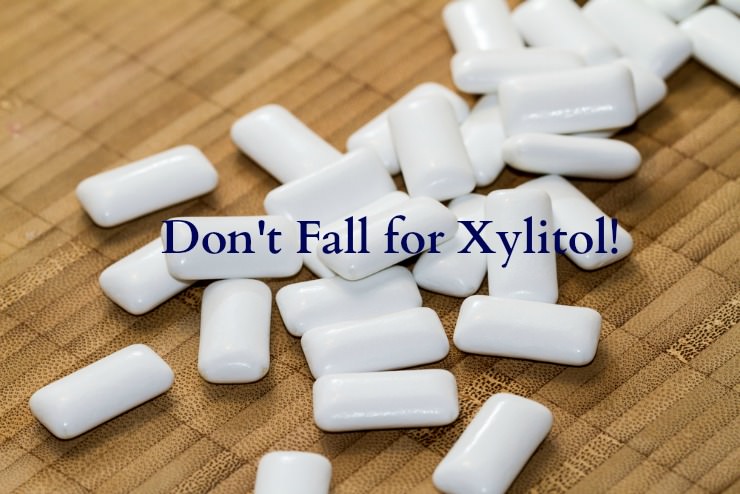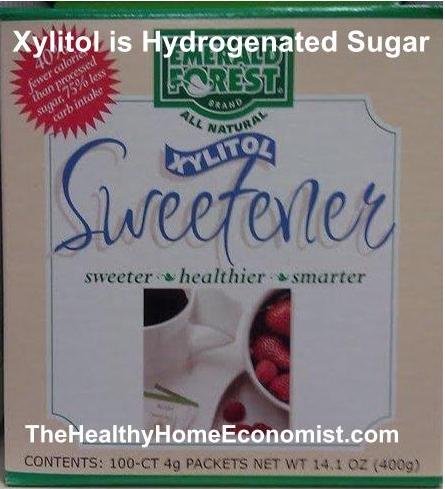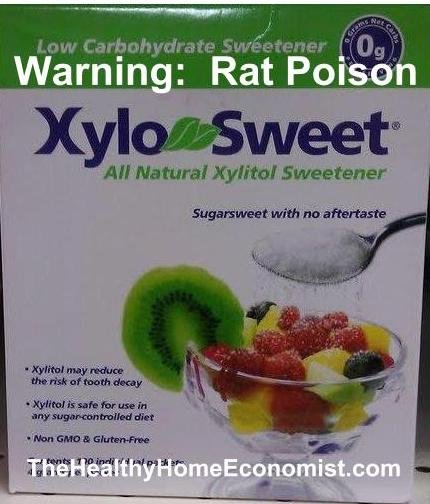
Xylitol is truly the darling of sugar substitutes today. The American Dietetic Association touts its use, with this sugar alcohol sold alone and as a sweetener in a variety of processed foods. Health benefits include a reduced glycemic response compared with sucrose, increased absorption of B vitamins and calcium, and even a reduction in dental caries risk.
Consequently, people with blood sugar issues are flocking to processed foods containing this alternative sweetener as a way to satisfy that sweet tooth without the downside of exacerbating the risk factors for Metabolic Syndrome. This condition is known for the markedly increased likelihood of developing heart disease, stroke, and type 2 diabetes.
Even the healthfood community almost universally considers this sugar alcohol to be a healthy substitute for sugar. A primary reason is that it doesn’t directly contribute toward the growth of intestinal yeasts aka Candida.
Have you noticed that the check out aisles at health food stores are typically loaded with chocolates and other sweets containing at least some xylitol? The truth is that I have yet to talk with any health-conscious person who suggests to me any downside other than the potential for intestinal cramps if you get too much.
Xylitol is Naturally Found in Nature
Xylitol is, after all, a naturally occurring substance. Manufacturers of xylitol market it as derived from xylan. The fibers of many plants contain it, including berries, oats, beets, sugar cane and birch. Sounds pretty harmless at first glance.
The FDA has even granted xylitol GRAS (Generally Recognized As Safe) status. You can’t get any safer than that, right?
 Manufacturing Process
Manufacturing Process
It is true that xylitol is a naturally occurring substance. However, manufactured xylitol is another matter entirely. Food manufacturers produce it using the industrialized process of sugar hydrogenation. In order to hydrogenate anything, a catalyst is needed. In this case, Raney nickel is used which is a powdered nickel-aluminum alloy. (1, 2)
This poses the risk of heavy metal residue and contamination. Nickel, by the way, is a recognized carcinogen and aluminum is associated with the development of dementia. Heavy metals in the body are notoriously difficult to eliminate with frequent use of infrared sauna probably a good idea.
This alternative sweetener doesn’t seem quite so warm and fuzzy anymore, does it?
There is currently no literature on any detrimental health effects of consuming hydrogenated sugar. However, food manufacturers widely used hydrogenated fats for decades before the very damaging effects of cardiovascular health became widely known!
Given the violent industrialized process that is required to produce a hydrogenated sugar like xylitol, it would seem wise to avoid it based on the very poor track record of hydrogenated foods in general.
Most Xylitol Sourced from GMO Corn
While it is true that xylitol can be derived from the xylan of birch trees, xylan is also found in corn cobs. It is much cheaper to use corn instead of birch bark to derive xylitol and so what do you think manufacturers prefer? Corn, of course.
Therefore, unless the label of a xylitol-containing product specifically notes that it is from birch or another nonGMO source, xylitol is very likely from genetically modified corn or possibly GMO sugar beets.
This is the same problem as high fructose corn syrup (HFCS) and white sugar from beets. Food manufacturers rely heavily on these sweeteners in the production of sodas and sports drinks.
You get a dose of GMOs with every sip! More on GMO dangers including sterility and stomach holes at the provided link.
Usage Contributes to Gut Imbalance
The digestive process does not break down sugar alcohols like food. Rather, xylitol arrives intact into the intestines.
At that point, a process called “passive diffusion” takes place. This means that the xylitol draws water into the bowels. Only a partial breakdown is the end result. The unmetabolized portion ferments providing the perfect environment for undesirable bacteria to thrive and grow.
It is true that xylitol itself does not feed candida directly as sugar does. As a result, this artificial sweetener is even promoted as a useful part of the Candida Diet. Unfortunately, the fermentation of undigested xylitol in the gut most definitely can exacerbate yeast problems. Don’t be fooled by this argument!
This is exactly why consuming xylitol can make some folks so gassy and even trigger cramping and diarrhea. Gut pathogens having a heyday in your intestines give off a lot of smelly toxins!
Other Little Known Problems
Xylitol can contribute to acid reflux problems. As a result, those who have issues in this area should avoid it for that reason alone. Chronic acid reflux is a serious problem that can lead to cancer of the esophagus and larynx.
In addition, those who suffer from seizures of any kind should stay away from this alternative sweetener as it can increase the frequency of epileptic attacks.
Two Pieces of Xylitol Gum Can Kill a Rat?
According to unpublished lab tests, approximately 1.65 grams of xylitol kills a 100-gram rat half the time.
Two little pieces of xylitol gum contain about .7 – 1 gram. This is probably enough to meet the definition of rat poison.

Cavity Prevention
Many people are chewing xylitol gum due to compelling scientific evidence for cavity prevention. What about children, however?
Rami Nagel, author of Cure Tooth Decay, doesn’t even recommend xylitol gum for this purpose. His research for any long term safety data turned up the following:
- Epidemiology: No information found
- Teratogenicity: No information found
- Reproductive Effects: No information found
- Mutagenicity: No information found
- Neurotoxicity: No information found
In summary, using this modern substance officially renders you a guinea pig, my friend! It seems that any benefits of cavity prevention are outweighed by the fact that there is no actual safety data backing up its use.
Safe Uses of Xylitol
Given all the problems that consumption of xylitol can trigger, it seems best to bypass the use of this sugar substitute on a regular basis.
Can it ever be helpful? Does it have any benefits whatsoever?
Potentially so. The only time I personally would ever consider using xylitol is to help resolve a childhood ear or sinus infection in order to prevent the use of drug-based antibiotics.
There is evidence that this popular sugar alcohol can indeed help encourage a healthy balance of beneficial bacteria found in the ear canal and sinus cavities. Products like this incorporate xylitol for this purpose.
A therapeutic dose can help resolve infection in these areas quickly with no medication required.
Thus, if you choose to use it, make sure it is sparingly and therapeutically (not as food). Also, make sure it does not come from a GMO source like corn!
References
(1) Xylitol production via catalytic hydrogenation of sugarcane
(2) Catalytic hydrogenation of xylose to xylitol using ruthenium catalyst on NiO modified TiO2 support
(3) Cure Tooth Decay by Rami Nagel
(4) Sugar-Free Blues: Everything You Wanted to Know about Artificial Sweeteners
More Information
Yacon: Healthy Syrup or Healthfood Hype?
Jaggery: India’s Sweet Gift








This is a fairly irresponsible article. And you’ll notice that “Sarah” the author has not commented on one comment through the whole thread.
When I was a professional journalist for 20 years, it was poor ethics to comment on my own articles. If a Letter to the Editor warranted, I pursued a follow-up story with new interviews and new research.
yes, read the thread and make your own informed decision rather than blindly accepting the opinion of one nay-sayer. I too use xylitol every day and would not want to be without it.
Wow I am glad I found your article. A company wanted to me to do a review/blog post of their healthy kid shake. I always check ingredients before agreeing to do reviews. The product contains xylitol contains and that is how I found your article. I am telling them no thank you.
Thank you
Sandi
Sandi,
Before deciding no, you might want to read this thread and do some Internet research. Many others believe and have data to back up the use of xylitol as safe and beneficial. I use it every day.
Hello. There is not a lot of negative data surrounding Xylitol on the internet for humans, however, I thought I would contribute my own personal experience. I began using Xylitol 1.5 years ago, and a bit over a year ago I was diagnosed with epilepsy. I put a lot of this in my coffee’s and drink a lot of coffee, so my consumption was rather large. Probably unreasonably so, but I was under the impression this stuff was 100% ‘safe’.
We are now 95% confident that Xylitol was the cause of my epilepsy. I have only just stopped using it, and it is early days (too early to truly know for sure), but I feel so much better for stopping. My head feels so much clearer, almost immediately.
It also caused my kidney function to drop to as little as 20% after one of my epileptic attacks (and all my vomiting) if our theory is correct.
I would advise anyone to stay away from consuming very large amounts of this stuff, or to at least listen, closely, to your body. I might be the minority, but I still demonstrate a clear possibility of toxicity from this substance in humans in high doses.
– Sam
About rats…
Consuming oranges/orange juice is detrimental to the health of male rats, potentially even deadly. So, should all human males now avoid oranges?
If you say no, then think twice about automatically using a rat’s reaction to a substance as reason for humans not to consume something.
Yes, and Penicillin is toxic to Guinea Pigs, chocolate can be toxic for dogs, etc. Giving people advice on what is safe for consumption based on an animal’s reaction is irresponsible.
If 100g rat was given 1.6g xylitol, that would be like me eating 2 pounds! I would die too. Processed sugar and carbohydrates facilitate obesity, which is the number one killer. Xylitol is good in moderation. Processed sugar is not.
Wow, thanks for sharing that Sarah. I certainly wish I’d discovered xylitol before I had my son. I too breastfed him long-term and experienced a lot of dental issues. Fortunately, his teeth are better than mine, but I think that if I’d used xylitol, it would have improved his dental health.
Don’t be alarmed at this article since it contains NO REAL INFORMATION against xylitol. Way to scare people because you just “think” it must be bad, even though all of the evidence, both peer reviewed medical studies and anecdotes prove otherwise. Xylitol in pregnancy actually decreases cavity risk in the child after it is born. I ate very health natural foods, but after I nursed my first son for 22 months my teeth were trashed, I had 14 cavities at once, and wound up needing 2 root canals from all the damage. Poor kid also wound up having a lot of tooth problems and the dentist was baffled as to what was going on since we took such good care of his teeth. I had xylitol while pregnant with my next and even though he had the same diet as my older son, they both breastfed past one year, and we did the same oral health procedures, he has never had a single cavity compared to his brothers 10 cavities. I owe it to xylitol and I am so thankful for it.
If “health” advocates are going to continue maligning EVERY single food in existance we might as well all become “breatharians”
I agree with you. The author provides no scientific evidence (where’s the links to such evidence). I talked with a scientist from a leading organic Xylitol company who debunked everyone one of her assertions.
Yep, let’s preserve that paycheck at all costs!
What might be a safe, low-glycemic alternative to refined sugar? Molasses? Lucuma? Monk Fruit? Yacon?
I have coconut sugar, and I used to use Sucanat. But I think these spike blood glucose levels.
Thanks
Just curious but oil pulling with coconut oil is supposed to pull out toxic chemicals right? So brushing with xylitol in your toothpaste then pulling should cancel out the negative? I tried toothpaste with no sweetener and threw it up instantly. The least amount of xylitol in my toothpaste I can stand is 7 tbs… Is this too much? Overly dangerous, etc?